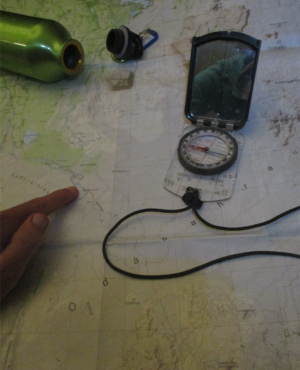How does the shown object point to a better world?
The compass shows you the direction even when the sun is not shining. It does not tell you what your destination is, but it can help you stay on course.
Suðurárbotnar, in the Icelandic desert.
“I hope…” begins Larus. “I hope we can find water tonight.”
Not tonight, my ass. It’s after midnight, over the land lies the twilight of a clear summer night just below the Arctic Circle.
“That there’s no tap here either,” I try to joke. The tongue sticks to the palate, the rucksack weighs on the shoulders.
“I wonder if we’re over yet?”
The highland track we follow is hardly marked here. Even jeeps leave no traces on the black, rigid knitted lava.
I nestle the compass out from under my jacket. Against the pale sky, right in front of us, two table volcanoes rise above the arid surface.
“Sellandafjall lies just north of us,” I say. “We’re not past it, look, we must be close to it…”
We’re dragging on. Stop, listen. A soft gurgling. We have found the source: living water in the desert.
Politics is chaotic; global production chains are engulfed. Like a wilderness, the future lies ahead. How many millions dream of a better life?
That is the goal. And we need a new compass, the magnetic needle of humanity: a course to pure water, to the light of sunrise, to a good life for all.
This is how I imagine a better world:
The Glasshouse
(June 2051)
I get my bike out of the shed, thinking about the lecture I am about to give. Introduction to oceanography: freak waves and tsunamis.
The postman waves to me excitedly, with a big green envelope. I recognise the printed logo of Mother Earth, and my heartbeat stops.
The Earth Parliament.
The letter confirms my suspicion: “… You have been drawn by lot to represent your region next year, in 2052, on the Earth Parliament’s Council of Experts, the Commission for Climate and Clean Environment. Please let us know by early September whether you accept the appointment.
What should I do?
I am, in fact, a supporter of this system. Every year, 500 citizens from all over the world and 500 experts are drawn by lot to legislate on issues of global concern. The experts propose, answer questions; the citizens’ council makes the final decisions. All in complete transparency; “the glass house” is also called the Earth Parliament.
I admit: when the Earth Parliament first met in 2022 — a reaction to the corona shock — I had my doubts. How were these randomly thrown together people, a good 20% of whom were illiterate, to solve the complex problems that had kept scientists and experienced politicians at bay for decades? But it was precisely the earthy wisdom of African smallholders, the determination of Indian slum dwellers with their crystal-clear view of the essentials, that made a decisive contribution to steering the world onto a new track. The “glass house”, initially smiled at as utopian, has changed many things for the better.
But even sitting in it? Sacrifice a year, let my students down? And above all, I am only a natural scientist. One of those ivory tower dwellers, my head full of equations, without any expertise in politics or practical problems. Or am I just saying this to avoid a difficult task?
When I reach the lecture hall, I am still lost in thought. Instead of my notes, I accidentally ripped the envelope from my bicycle bag. The students start whispering, and Ayesha, the most talkative of the group, shouts: “Hey, have you been drawn into the Earth Parliament? That’s great! Then the international tsunami warning system will certainly be installed next year…”
“And you could present the new method for removing CO2 that they are working on at the University of Delft”, Leonardo adds enthusiastically.
I catch myself smiling. Why didn’t I come up with this idea right away? Our greenhouse gas emissions have been fairly well under control over the last decades, but the removal of the CO2 emitted in the past is still an urgent problem. A race against time to save Greenland’s ice cap.
The wave equation, which is on the curriculum for today, has been forgotten. We discuss, or more precisely, the students discuss, and I listen, collect suggestions on the digital board, call the speakers if there are too many requests to speak. When the lecture period is over, we are far from finished, but we have decided to organise a workshop after the semester break, open to all students and interested city dwellers.
It’s only on the way home that I notice that none of the students have asked me whether I want to accept the appointment. But actually, that question has been resolved.
This text was translated by machine. See original text.


